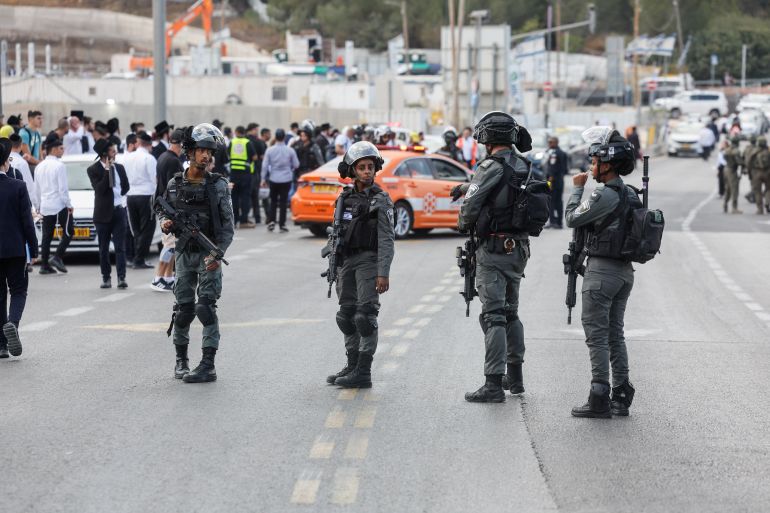Israeli forces have stormed towns and begun demolishing homes of Palestinian suspects in the wake of a deadly attack in occupied East Jerusalem, raising fears of further military and settler violence and collective punishment in the occupied West Bank as Israel relentlessly pounds Gaza.
Israel said on Tuesday it had surveyed and ordered the demolition of the homes of two Palestinians suspected of the attack at Ramot Junction in occupied East Jerusalem, which left six dead and 12 injured. Both suspects were killed in the attack.
Recommended Stories
list of 3 itemsend of list
In a statement, Defence Minister Israel Katz said he had also ordered sanctions to be imposed on the men’s family members, as well as residents of their towns – Qatanna and Qubeiba, north of Jerusalem in the occupied West Bank.
Those sanctions included the demolition of every structure that had been built without permits in the towns, and the revocation of 750 work permits and entry permits to Israel.
Israeli government ministers, including Katz and far-right National Security Minister Itamar Ben-Gvir, issued hardline statements in the wake of Monday’s attack, vowing to demolish homes and deport their family members.
While Israel claims such actions are intended as a deterrent to future attacks, Palestinians and human rights groups say they amount to a form of collective punishment, prohibited by international law.
Home demolished southwest of Hebron
Amid the crackdown in the occupied West Bank on Tuesday, Israeli forces also destroyed the home of another Palestinian suspected of having carried out an earlier shooting attack in December.
Soldiers encircled the house of detainee Thabet Masalma in the town of Beit Awwa, southwest of Hebron, before blowing up the property with explosives.
The raid sparked clashes with locals, during which Israeli troops fired live ammunition, wounding two people.
Masalma is accused of being part of a shooting attack eight months ago that resulted in the death of an Israeli settler and wounded three others.
The demolition leaves the detainee’s wife, parents and three children homeless.
Israeli human rights group B’Tselem has documented at least 26 homes demolished in the occupied West Bank as a punitive measure in 2025, displacing more than 70 Palestinians.
Tensions high
While raids and settler attacks against Palestinians in the occupied West Bank have ramped up since the war in Gaza began, Monday’s attack has heightened tensions and sparked fears of increased violence and repression.
On Tuesday morning, the Palestinian Wafa news agency, citing local sources, reported that Israeli forces stormed the town of Biddu and closed its main entrance that connects it to the town of al-Jib, which is the only main road for nearly “70,000 citizens in the area”.
During the raid, Israeli forces fired live bullets, sound bombs and, amid clashes with locals, fired toxic and tear gas.
Israeli forces also raided several towns northwest of Jerusalem and carried out arrests using heavy tear gas.
Following Monday’s attack, Israeli army chief Eyal Zamir said in a statement that he had ordered a “full closure” of the area that the alleged gunmen had come from.
“We will continue with a determined and ongoing operational and intelligence effort, we will pursue terror cells everywhere, and we will thwart terrorist infrastructure and its organisers,” he said.
Local sources on the ground told Al Jazeera Arabic that a number of settlers had attacked homes belonging to Palestinians and spray-painted racist slogans in the village of Jurish, south of Nablus.
Wafa reported that Israeli settlers also vandalised vehicles belonging to Palestinians in Jurish, breaking their windows, while another group of settlers cut down olive trees grown by Palestinian families in Aqraba, a town southeast of Nablus.
Meanwhile, in Hebron governorate, Israeli forces arrested two people and set up several military checkpoints at the entrances to the towns, villages and camps. Soldiers also closed several primary and secondary roads, Wafa reported.
Source: Aljazeera

Leave a Reply